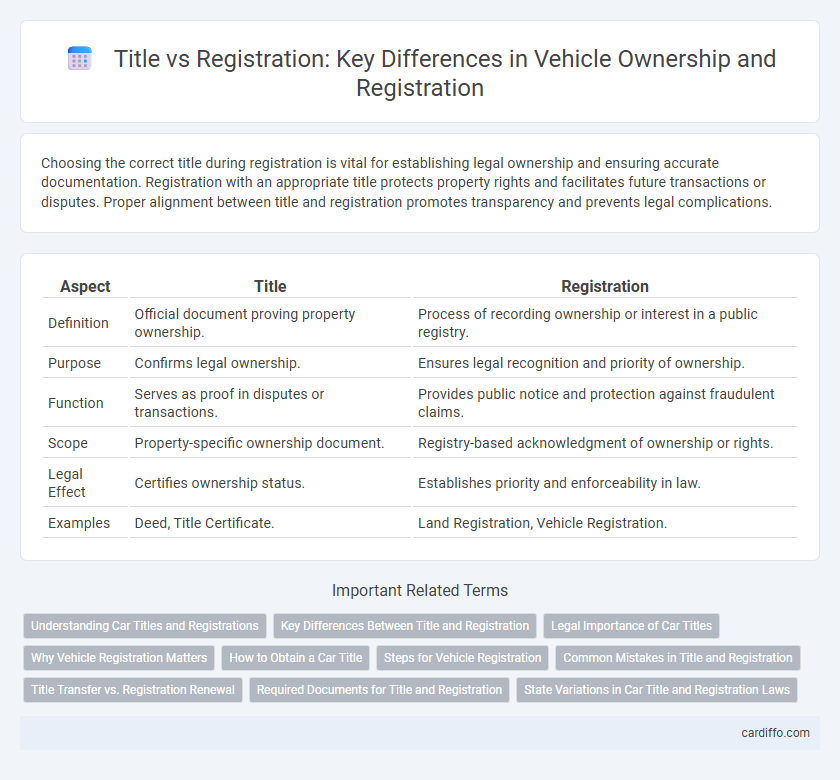Choosing the correct title during registration is vital for establishing legal ownership and ensuring accurate documentation. Registration with an appropriate title protects property rights and facilitates future transactions or disputes. Proper alignment between title and registration promotes transparency and prevents legal complications.
Table of Comparison
| Aspect | Title | Registration |
|---|---|---|
| Definition | Official document proving property ownership. | Process of recording ownership or interest in a public registry. |
| Purpose | Confirms legal ownership. | Ensures legal recognition and priority of ownership. |
| Function | Serves as proof in disputes or transactions. | Provides public notice and protection against fraudulent claims. |
| Scope | Property-specific ownership document. | Registry-based acknowledgment of ownership or rights. |
| Legal Effect | Certifies ownership status. | Establishes priority and enforceability in law. |
| Examples | Deed, Title Certificate. | Land Registration, Vehicle Registration. |
Understanding Car Titles and Registrations
Car titles serve as legal proof of vehicle ownership, detailing the owner's information and any liens, while registrations provide authorization for the car to be driven on public roads. Understanding the distinction ensures proper documentation for ownership transfer and compliance with state laws. Accurate title and registration management prevents legal issues and supports smooth vehicle transactions.
Key Differences Between Title and Registration
Title certifies legal ownership of a vehicle, while registration validates the vehicle's authorization to be driven on public roads. The title includes details such as owner name and lienholders, whereas registration contains license plate information and expiration dates. Title transfers occur during ownership changes, but registration must be renewed periodically to maintain road legality.
Legal Importance of Car Titles
Car titles serve as the official proof of ownership and are critical in legal transactions involving vehicles, whereas registration primarily grants permission to operate the vehicle on public roads. Titles contain vital information such as the vehicle identification number (VIN), owner details, and any liens, ensuring clear ownership rights and facilitating sales or transfers. Without a valid title, proving legal ownership becomes difficult, which can complicate financing, insurance, and dispute resolution.
Why Vehicle Registration Matters
Vehicle registration establishes legal ownership and links the car to its owner through official records, which is crucial for law enforcement and toll collection systems. It ensures compliance with safety and emissions standards by requiring periodic inspections, thus promoting road safety and environmental protection. Registration also facilitates the recovery of stolen vehicles and helps in resolving disputes related to vehicle use or accidents.
How to Obtain a Car Title
To obtain a car title, first gather essential documents such as the bill of sale, proof of insurance, and identification. Then, submit these documents along with the vehicle registration application to your local Department of Motor Vehicles (DMV) or relevant authority. Pay the required fees and complete any necessary vehicle inspections to receive the official car title, which legally proves ownership.
Steps for Vehicle Registration
Vehicle registration involves a series of steps including providing proof of ownership, typically the title, submitting required documents such as identification and insurance, and paying applicable fees at the local Department of Motor Vehicles (DMV) or relevant authority. The title serves as legal proof of ownership, while registration links the vehicle to the owner for taxation and legal purposes. Completing registration ensures the vehicle is legally authorized for road use and records ownership details in government databases.
Common Mistakes in Title and Registration
Common mistakes in title and registration include mismatched information such as incorrect owner names, addresses, or vehicle identification numbers (VIN) that can lead to legal complications and delays. Failure to update registration after a change of ownership or address causes fines and invalidates insurance coverage. Overlooking the expiration date on registration results in penalties and potential vehicle impoundment.
Title Transfer vs. Registration Renewal
Title transfer involves legally changing the ownership of a vehicle to a new owner, which requires submitting a signed title and paying applicable fees to the motor vehicle department. Registration renewal, by contrast, is the process of updating the vehicle's registration status to legally continue driving, often requiring payment of renewal fees and proof of insurance or inspection. Unlike title transfer, registration renewal does not alter ownership but maintains the vehicle's compliance with state regulations.
Required Documents for Title and Registration
Registering a vehicle requires submitting proof of ownership, typically the title document, alongside identification and proof of insurance. The title serves as the legal document proving ownership, while registration involves providing additional documents such as a completed application form, vehicle inspection certificate, and payment of applicable fees. Accurate submission of these required documents ensures legal compliance and smooth processing during both title transfer and vehicle registration.
State Variations in Car Title and Registration Laws
State variations in car title and registration laws impact the timing, fees, and documentation required for vehicle ownership transfer and legal operation. Some states combine the title and registration process into a single step, while others treat them separately, requiring distinct applications and payments. Understanding these differences is crucial for vehicle owners to ensure compliance with local regulations and avoid penalties.
Title vs Registration Infographic

 cardiffo.com
cardiffo.com